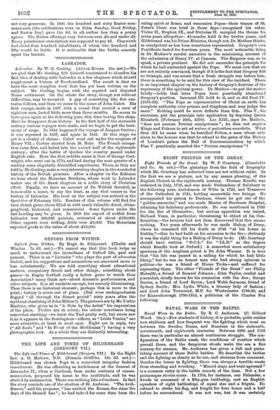The Life and Times of Hildebrand (Gregory VII.) By the
Right Rev. A. H. Mathew, D.D. (Francis Griffiths. 12s. 6d. net.)— Hildebrand was chosen Pope in a somewhat irregular fashion turaultuarie. He was officiating as Archdeacon at the funeral of Alexander II., when a Cardinal, then under sentence of excom- munication, proposed his name to the multitude, and he was elected by acclamation. There was nothing like a Conclave. In fact the story reminds one of the election of St. Ambrose. "The Arch- deacon," said his proposer, "has exalted the Roman See since the days of the blessed Leo "; he had indeed for some time been the
ruling spirit at Rome, and successive Popes—their tenure of St. Peter's Chair was brief in those days—recognised his value. Victor LE., Stephen IX., and Nicholas II. occupied the throne for seven years altogether: Alexander held it for twelve years, and Hildebrand was his Prime Minister, though not, Dr. Mathew thinks, as omnipotent as has been sometimes represented. Gregory's own Pontificate lasted for fourteen years. The most noticeable thing in Dr. Mathew's careful narrative is the minimising account of the submission of Henry IV. at Canossa, The Emperor was, so to speak, a private penitent. He did not surrender the principle for which he had contended against the Pope. We must own that we are not entirely convinced, though if it is the fact that Gregory felt no triumph, and was aware that a fresh struggle was before him, there is something to be said for this view of the incident. There is an important chapter on the history of Gregory's doctrine of the supremacy of the spiritual power. Dr. Mathew—to pit the matter briefly—holds that later Popes have practically abandonel Gregory's position. Innocent III. held to it and so did Paul IV. (1555-59). " The Pope as representative of Christ on earth has complete authority over princes and kingdoms and may judge the same." Nothing could be more definite than this. Pius V., his successor, put the principle into application by deposing Queen Elizabeth (February 29th, 1570). Leo XIII., says Dr. Mathew, " does not assume Petrine omnipotence"; he does not require Kings and Princes to act ad nation et patientiam sacerdotis. What then did he mean when he beatified Felton, a man whose only claim to the honour was that he affixed to the gates of the Bishop of London's palace the Bull of Excommunication by which Pius V. practically asserted the "Petrine omnipotence " ?






















































 Previous page
Previous page